- Home
- Barbara Kingsolver
Unsheltered Page 7
Unsheltered Read online
Page 7
“What?”
Tig upped her decibels. “Papu, do we come from the Caucasus Mountains?”
“Hell no, mountains of Crete. Voukolies. One hundred generations.”
Zeke lifted his eyes in mock reverence. “Since the first Voukolian virgin was impregnated by Zeus.”
“It wasn’t a human female,” Tig said. “I’m pretty sure it was a swan. Look at your nose. That honker is proof, we are descended from swans.”
Willa was floored. Tig had mostly left Zeke alone since Helene’s death, but now at the first sign of life she was nipping at his heels. “What about my genes?” Willa asked. “A Greek last name doesn’t erase your other half.”
“Mom! Did our Knox ancestors come from the Caucasus Mountains?” Tig asked.
“No. Just the usual boring Anglo-Saxon stuff. As you know.”
“Okay, we’re not Caucasians.”
“You know what I meant,” Zeke said. “White.”
“White is not an origin. It’s a mental construct of privilege.”
Willa had watched this fight forever: the Eagle Scout and the Maverick, separate but equal in self-righteousness. Through their teenage years she’d hoped college and distance might one day let them relax and find common ground, even miss each other. Maybe that had happened. But here under one roof again their child selves showed intent to rule. She could see it in their posture: Zeke stubbornly planted forward on his elbows, Tig gaining height on him by standing on her knees in her chair.
“You’re saying there are no categories of relatedness among humans?”
“Nope. I’m clueing you that the term ‘Caucasian’ was invented in the seventeen hundreds by German philosophers who said God put the colored folks on all their subpar continents and the beautiful whiteys in the mountains of eastern Europe.”
“Thank you, Wikipedia.”
“I’m not Wikipedia, I just have a good memory.”
“Why memorize a stupid factoid like that when you can look it up on your phone? Oh, excuse me I forgot, you don’t own one.”
“Holding and synthesizing information in your brain creates your personality. You’re surrendering your personality to an electronic device in your pocket.”
“Yep. Just one more of those boring drones that finishes his education.”
“At least I have a job. I’m contributing to the household.”
“Okay, that’s not fair,” Willa cut in. “Zeke is caring for a newborn and recovering from trauma. Grief takes energy. I still feel like I’m hiking uphill after losing Mama.”
Both kids glanced at her oddly.
“I’m not saying it’s the same. My mother got to live a pretty long life, she got to see me grow up.” Willa stopped, avoiding her children’s stares. She should be over this, in their opinion. They all observed an uncomfortable moment of silence.
“I’m going to start working from home,” Zeke then announced.
“Really. Your start-up?” Iano looked thrilled.
“Our investing firm. I talked with Jake and Michael today. That’s actually the reason I went out for the drive. They’ve been after me to talk stuff over, so we finally had this crazy Bluetooth conference call in the car, with Little Big Mouth raging in the background. But it worked out. The name of our firm is Good Money.”
Wow, thought Willa. Grief compartmentalized.
“As in throwing good money after bad,” Tig offered.
“As in the fastest-growing sector of personal finance management. Microloans, fossil fuel–free bundles. Socially responsible investments.”
“Keep telling yourself that. Helping rich people get richer is socially responsible.”
“Look, money’s an engine and it’s out there running day and night, whether you like it or not. For bad or for good. The global move to divest from South Africa is what finally brought down the apartheid regime. You can’t dispute that.”
Willa felt her daughter could dispute God on the scheduling of Judgment Day, or whatever the pagan equivalent might be, so she was surprised to see her clam up and reach across Nick for the salad bowl.
“So if gas and oil guys are the evildoers now, my company will help people get their retirement funds into companies that build solar cells. Or women’s cooperatives in India, if that’s their thing. We’re disrupting the conventional models. Lots of our clients will be middle-class investors. It’s just about increasing the bottom line, wherever you are.”
Tig rolled her eyes. “Humans have outgrown the carrying capacity of the planet. The responsible thing would be to shrink our bottom line.”
“Hey, gee, we tried that! For five centuries before the Industrial Revolution. It was called the Dark Ages.”
“That’s true,” Iano said. “You can’t really have civilization without growth. It would be a zero-sum economy: I have needs, everyone has needs, and the only way I could gain something is to take it away from you.”
“Dope scenario, Dad,” Tig said, “only the world is zero sum. When you take stuff out of the land and ocean, that’s taking. You’re just pretending there’s always going to be more, which there isn’t.”
“When you plot low-growth periods in history,” Iano said, “you see Hitler and you see Genghis Khan.”
“Plot it any way you want. I’m not choosing this. I just lucked into the moment of history when your folklore about permanent expansion goes down the toilet.”
Willa wondered how many tuition dollars they’d invested in this conversation, and whether she could get a refund; she wished they would all shut up and eat. Zeke was gasoline to Tig’s fiery temper, even when he used the kind of stockbroker language that in Willa’s experience numbed people’s skulls: “Growth every quarter is the only success that matters to investors. The drive to expand is the engine of the economy. That’s just how it is.”
“Anyway,” Iano said, “people will figure this out. Capitalism is going green.”
“God, you guys! There’s this thing called biocapacity, plant and animal biomass the earth produces, total. It’s a measurable quantity. Know how much of it we’re using?”
“Less than one hundred percent, I assume.”
“No. More! By twenty-five percent a year. How the fuck long do you think that can last?”
The defiant blue note roused Nick, who’d been drooping into a nap. “Young lady, you don’t know how lucky you are to have shoes on your feet and a roof over your head.”
“Look, Papu, I’m barefoot.” She showed him her feet.
The roof over their heads was also in question, Willa could have pointed out. But Nick was launched. “What I saw in the Greek Civil War. Brother against brother. The communists took what they wanted and if they didn’t want it, they burned it. You want to go back to that? Be my guest. Your yaya and me were lucky to get out with the skin on our backs, so your father and his sisters could get born in America. No father for you, your yaya and me starving to death: that’s what the communists wanted.”
The family had heard Nick’s brother-against-brother rant too many times to care anymore, even if escaping the Greek Civil War was the defining event of Nick’s life. And of Iano’s too, Willa suspected. He was born more than a decade after Nick and Roula settled in Phoenix, and disagreed with his father on nearly everything, but he’d grown up on those stories. The communists were his Big Bad Wolf.
Iano was in full professor mode now: open face, open palms, the image of a good listener. His students were always smitten, not just because of his hot-chili-pepper ranking on ratemyprofessor.com. The charisma had probably inflamed his tenure problems, provoking rumors of student liaisons that his jealous peers were too eager to believe. “That’s Europe,” he was saying to Zeke, on some conversational train Willa had missed, while Tig quietly helped herself to seconds. “I agree you’ve got demographics working against you. But the developing countries have young populations, and most of their growth still ahead of them. And then there’s China, driving everything.”
“Actually, Da
d, the renminbi is tanking. Rail freight volumes there are down, Shanghai equity is down.”
“As of when?”
“Over a year. You didn’t know this?”
“I’m a political scientist, son, not an economist.”
“Everybody has their theory, but it looks like China’s economy has peaked.”
His or her theory, Willa did not say, swallowing the powerful impulse toward correction that made for first-rate editors and insufferable human beings. “Look at you two guys. The most optimistic people I know, shaking down the subject of doom.”
“Not doom, Mom,” Zeke said. “Crisis is opportunity.”
It felt surreal, watching her family bicker about abstract catastrophe under an actual collapsing roof, but it was a relief to see her son animated again. Zeke embodied the contradiction of his generation: jaded about the fate of the world, idealistic about personal prospects. A house built on youth’s easy courage. And Tig in her way was also brave, dissecting the world as she saw it, believing her strategies mattered. In a world of people who either let things happen or made them happen, these kids were instigators. Willa felt obsolete. The need to shelter her family never lifted its weight from her shoulders, but in practical terms she was useful to no one there but the dog and the baby. She sat watching her motherless grandchild, whose eyes darted under closed lids while his face worked through a range of pouty, knit-eyebrowed emotions like an acting-class warm up. At his last checkup the pediatrician had observed the howling red face and trembling limbs, and said that infants process grief as trauma. Then suggested they try a different formula.
“Per capita GDP in the US has been pretty stagnant, Dad. You know that, right? Income used to be tied to productivity of the economy but that hasn’t been true since 1978. Actually it’s gone the other way since then. There’s different ways to chart it against inflation, but the median paycheck is definitely in decline.”
“That’s what I keep wondering about,” Willa said, startling Iano and Zeke as well as herself. Both men turned to her.
“It just seems like … I don’t know. There’s less money in the world than there used to be. I don’t know how else to put it. Like something’s broken.”
Her husband’s and son’s polite smiles were spookily identical.
“Obviously I don’t know how it works. Supply and demand.” Willa hated how naive she sounded. “I just know people have always assumed their kids would grow up better off than the generation before. You know what I’m saying. Like Nick and Roula.” She glanced at Nick, drifting off, spent from his outburst. An unlikely ally in any case. The rest of the family observed Willa as if she’d blown some unexpected fuse.
“They knew they could go somewhere and make a better life. That’s all I’m saying. It goes back forever, to Odysseus, or Moses and the Israelites. My serf ancestors eating rocks on the Shrewesbury plain. The one thing you can trust is your kids will have more, not less. And now …” Willa gestured at air. What part of shambles could they not see?
Iano switched on his chili-pepper smile. “Supply and demand. That’s it, exactly. We’re in a new era of supply right now. Productivity is exploding, and sometimes that takes new forms. Computer technology replaces jobs, for example. So you see a boom on the take side, but fewer working hours on the other. The market eventually adjusts.”
“Zeke just said it’s been stuck since, what, the seventies? Didn’t you? That’s a whole generation. More like two.”
“But Dad’s right,” Zeke said. “New technologies have a transformative impact on economic output, and eventually that will rebound. Supply and demand is a law, like physics. If you go too fast, your car overheats and you slow down.”
Or your car drives into a tree, Willa thought, and bursts into flames.
Iano turned back to Zeke. “So look, you have these oil-rich countries like Venezuela and Nigeria. They’ve still got a lot of GDP growth in their future.”
“Not without a superpower to throw money into their production sector. They’ll stay undeveloped, just like Cuba did. A cold global economy is like a de facto embargo. Plus, nobody’s ever going to pay a hundred dollars a barrel for oil again.”
Tig glanced up on the Cuba cue. “They’ll wish they could when it’s gone. And anyway, gross domestic product is a stupid way to measure a country’s success.”
Zeke laughed in his old appealing way, all white teeth and cute laugh lines. “Stop it! That’s like saying gravity is a stupid way to predict downward force.”
“So how do you stimulate the economy in the twenty-first century?” Iano asked.
“Now that’s a good question,” Zeke said.
Willa opened her mouth. Didn’t she just ask this, in a more self-centered way?
Tig stood up and began collecting empty plates. “For starters,” she said, “you acknowledge that stimulate is a synonym for stealing from the future.”
“You’re wrong, Dad’s right,” Zeke said. “The minute you shut down growth, you start living with scarcity. Simple math. You end up between a rock and a hard place.”
“Scylla and Charybdis,” Nick erupted, startling them all. Skeela and Hareev-thees he pronounced them, in Homer’s own Greek. If her father-in-law had actually read The Odyssey and could apply it metaphorically, Willa was going to have to recalculate.
“The six-headed monster and the whirlpool that swallows ships whole,” she clarified. “That’s actually a thing, a Homer reference. Odysseus had to sail between two impossible dangers to get to safety. As a reader, you’re sure he’s going to die.”
In tandem her son and daughter shifted their stares from Nick to Willa.
“Thanks, Mom, but we know it’s a thing,” Zeke said. “We did AP English.”
“Okay, I wasn’t sure you remembered.”
“Exactly,” Iano concurred. “You start pushing for a no-growth agenda and we all end up between the devil and the deep blue sea.”
Willa studied Nick: his eyelids drooped, his chins folded themselves on his chest. Was this the stopped-clock situation, proverbially getting it right twice a day?
“Scylla,” she repeated. “And Charybdis.”
4
Scylla and Charybdis
Thatcher returned from his meeting to find Polly inconsolable.
He’d walked home from the schoolhouse in foul temper himself, fists in his pockets, recalling days when he and his brothers ran from the old man into the forest and howled like wolves. He would howl this minute, if the world still held one person with whom he could bare his soul.
And now here was Polly with her braying. The dogs, she shrieked, missing for hours. Kidnapped. She had evidence!
Thatcher took off his hat and prepared to tread cautiously. These two hounds had come with the house, an unexpected gift waiting when the family moved back to Vineland. Rose’s mother despised them, Rose ignored them, and Thatcher was sufficiently indifferent that he could not distinguish one from the other. It was Polly who knew their hearts. She’d spent the summer training them to useful tasks in the line of speak, beg, and climb (onto the divan). She’d discovered different temperaments in her pupils: Charybdis was Congregationalist while Scylla was Baptist. (He liked water.)
Thatcher thought their spiritual inclinations probably followed those of their former master, Mr. Nailbourne, the gentleman who’d rented the property during the years when Aurelia and her daughters lived in Boston. Mr. Nailbourne was a one-legged war veteran, unmarried, a music teacher and the owner of the town’s first piano, qualities that combined to make him famous. (Also a reader of the classics, Thatcher guessed from his well-named dogs.) With his rental cheques sent to Boston he’d often enclosed clippings from the Vineland Weekly describing his pupils’ recitals and accomplishments. Nowhere in any article had these canines appeared. The family learned of Scylla and Charybdis only from their renter’s final letter, wherein he disclosed his plan to move to Kansas and bring the refinements of music to the brutish Western Soul. His two well-trained Gas
con hounds were too attached to Vineland to make that venture, he said, so it seemed best to leave them behind. The woman next door would look after them until the ladies were reinstalled in their home, undoubtedly gratified to find it so well protected.
Mr. Nailbourne also left behind a reputation in town suggesting his attraction to the Western Soul’s greater leniency toward alcohol. Thatcher never mentioned this at home. If Aurelia knew the dogs’ history with an inebriate musician she might turn them out to the streets, where Polly might follow them.
As it was, poor Polly was exasperated with the dogs’ obvious preference for the house next door. They ran away regularly to Mrs. Treat’s front step, where they lay flanking the door like sphinxes. Day after day Polly fetched them back and scolded them for disloyalty. She had never kept an animal before. Thatcher explained they were honoring a duty to the woman who’d fed them after their master’s abandonment. The poor creatures must have been bewildered. “They are learning to love you now,” he counseled. “Give them time. A dog never fails to acknowledge devotion.”
But today’s crisis surpassed the ordinary. The dogs were not in their usual spot on the neighbor’s stoop. They’d gone missing for hours and hours according to Polly, who was sure they were being held captive by Mrs. Treat.
“By Mrs. Treat,” he repeated, still holding his hat in his hand. Polly hadn’t let him ten paces into the house before collapsing at his feet, the bell of her striped skirt wilting around her. “The lady doesn’t strike me as treacherous.”
“Charybdis and Scylla visit her every morning because she lures them. She gives them titbits.”
“So you see. Not the behavior of a villain.”
“But it isn’t fair! Mother won’t let me feed them anything special at all.”
Through the open parlor door Thatcher could see the corseted bulwark of his mother-in-law laboring at her writing desk, the shoulders grandiosely hunched in the muttonchopped sleeves of a florid dress. Aurelia was a cattleya orchid: immoderately showy. Epiphytic by nature, rising above the common dirt. Her hobby was to write letters to the newspaper decrying the corruptions on their town: Youthful disrespect for officers of the law. Spirits flowing in the Italian quarter. Thatcher now lowered his voice.

 Prodigal Summer: A Novel
Prodigal Summer: A Novel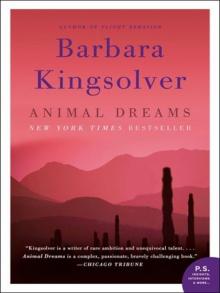 Animal Dreams: A Novel
Animal Dreams: A Novel The Poisonwood Bible
The Poisonwood Bible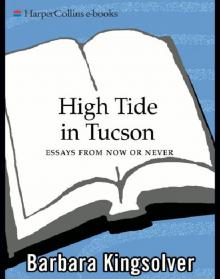 High Tide in Tucson
High Tide in Tucson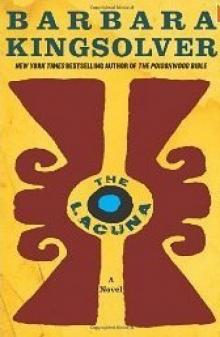 The Lacuna
The Lacuna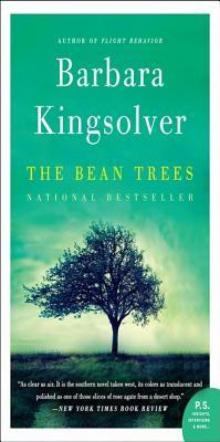 The Bean Trees
The Bean Trees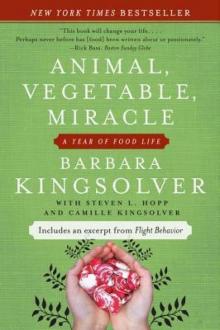 Animal, Vegetable, Miracle: A Year of Food Life
Animal, Vegetable, Miracle: A Year of Food Life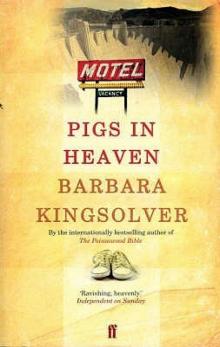 Pigs in Heaven
Pigs in Heaven Small Wonder
Small Wonder Flight Behavior
Flight Behavior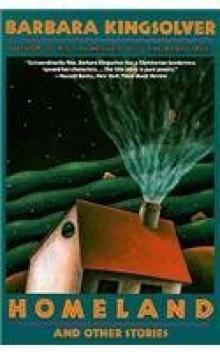 Homeland and Other Stories
Homeland and Other Stories How to Fly (In Ten Thousand Easy Lessons)
How to Fly (In Ten Thousand Easy Lessons) Unsheltered
Unsheltered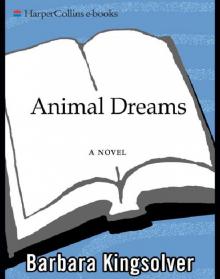 Animal Dreams
Animal Dreams Prodigal Summer
Prodigal Summer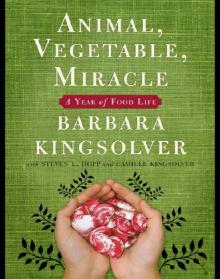 Animal, Vegetable, Miracle
Animal, Vegetable, Miracle